#and not in pursuit of an informed populace
Explore tagged Tumblr posts
Text
Every time I glance at the NYT or Washington Post it’s some variation of:
“VP Harris points out that Trump’s Project 2025 wants to ban abortion for everyone, no exceptions.”
Fact check: Trump responded ‘nu-uh’ so this is obviously a mistake, also he didn’t sign the print out so we can’t guarantee Project 2025 has anything to do with him. Rating: Mostly False.
“Trump insists on referring to VP Harris as Comrade Kamala.”
Fact check: While VP Harris has been a registered Democrat since she was 18, we cannot rule out that she secretly joined the Communist Party under an assumed identity or as some sort of Face/Off scenario. Also, she took a Politics 101 class her freshman year of college and has heard of Karl Marx, so that’s probably something. Rating: Possibly True.
“Tim Walz described his dog Scout as ‘the bestest boy’ in an Instagram post celebrating the family pet unearthed from 2019.”
Fact check: Walz has not met every dog ever and cannot say with authority that Scout is ‘the bestest’. Rating: Fucking Liar.
#us politics#I swear every fact check I’m seeing is just fucking nonsense#and not in pursuit of an informed populace#just utter fucking nonsense#they should be embarrassed
12 notes
·
View notes
Note
Sorry to bug you again, but can you confirm you got my request? The one about Y/N Cookie just one day going full isolation to research some eldritch force all Darkest Dungeon like? I just wanted to know before I decide to wait a whole year again because Tumblr ate it.

Under the Castle…
I got it now with this
You’d discovered something that you probably shouldn’t, but you have anyway. Something that could threaten the land of Crispia, something that could likely cause panic amidst your kingdom populace if they ever discovered the existence of such a force.
And it was right under your feet the whole time…

Your chambers would be on lockdown as you tried to learn any info on this eldritch force, heading to Blueberry Pie’s library to see and check out for any info that could bring up the topic about this…thing.



Well, you wouldn’t be completely isolated. You only entrusted this information about this situation with cookies like Dumpling Cookie, or cookies that already know, cookies you can entrust to not spread this info to the rest of the population. It’s also to let them know in case anything happened to you during your pursuits.
“Right, I’ll…make sure a word of this does not get out, okay?”
“I’ve been keeping this to myself for so long, it feels to see another cookie understand the gratitude of how delicate this matter is.”
“You have my oath, Y/N Cookie. None of this will get out to the public.”



Leave it to the more powerful cookies, ones who have likely seen all kinds of conditions cookies can get themselves, to notice that something was up with you. You haven’t exactly been yourself these last few days, it was starting to worry them. They can question you all they want..
“Y/N Cookie, if there’s anything wrong, you can tell me…”
“Is something troubling you, Y/N Cookie? I haven’t been able to visit your dreams lately…”
“Will you not walk with me? It can help clear your mind of any worries!”
You didn’t have the heart to tell them…but you didn’t let your mind dwell elsewhere, the excavation was underway underneath the castle.
You had to spend quite the amount of coins to have the workers never question what exactly they were looking for. You had Financier Cookie see to it that they don’t…

And now? As you’re prepping your gear? You’ll need her along with whomever you can trust to face whatever lurks underneath your castle…
#brittle answers#cookie run x you#cookie run x reader#cr x reader#cookie run#cookie run kingdom#crk x reader#cookie run kingdom x reader
270 notes
·
View notes
Text
Mel and Jinx, Co-Presidents of the Black Sheep Club
Isn't it crazy the way Jinx and Mel never interact but are practically foils to each other throughout the show? They both started out as black sheeps of their respective families for essentially the same reason, both excelled at different set of skills their families wouldn't or couldn't prioritize for their goals.


The traits that alienated both Mel and Jinx within their own families, and eventually had them torn away from them, also landed them in a place where their skills are valued. In Piltover, Mel becomes a master of court and the informal Head of Piltover’s council in a relatively short amount of time. With Silco’s resources, Jinx becomes one of Zaun's brightest and deadliest engineers and the best shot there is down there.
Ambessa, and Noxus in general, had no motivation to adopt Mel's perspective on diplomacy as it had the potential to weaken their family's standing. Vander wasn't equipped to handle or cultivate Jinx's skills in firearms or engineering nor was he in position where he could. Sure, Vander could support the other kids in their more manual pursuits, like boxing, lockpicking, and general physical strength building, but that's all he could do for Zaun in general. Vander as a leader was just maintaining Zaun in a way that didn't challenge Piltover's dominance, he couldn't support Jinx's skills because those were areas Piltover used to assert force over Zaun.

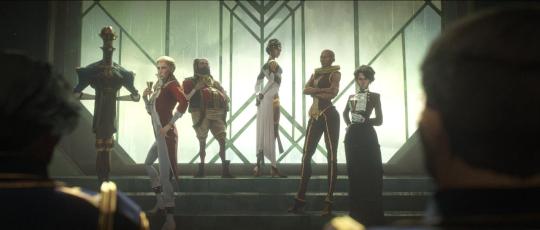
Jinx and Mel are both characters that are well acclimated to violence thanks to their mentors (Ambessa, Vander, and Silco) and environment, and are now effective actors of violences in their respective spheres. It's obvious with Jinx, she's a willing force within Silco’s empire. Jinx also runs around with grenades and guns and rockets killing enforcers and firelights alike. With Mel, she oversees an incredibly violent hierarchical system as the informal head of Piltover’s council that does cause on screen civilian casualties. Mel herself is also comfortable sending a militarized force into Zaun to shakedown the populace to assert the illusion of control. Even Mel's plans for hextech (outside of weaponizing it) were a form of economic violence to Zaun as it made Piltover less dependent on Zaunite labor, the one thing they could leverage.

Where the two really diverge is how they handle power and conflict. From the beginning Mel enjoyed being the politician behind the current, never putting herself in full risk of fallout by hiding behind her choice of figurehead. This passivity that helps Mel avert risk extends throughout business and social life. Mel doesn't seek out Jayce on his hextech theory she stumbles upon him in when he's breaking into the Academy. When Mel's upset with Jayce she lets him come to her. When Mel misses out on new hextech investors she let's an opportunity present itself to let her make up for it rather than confront Jayce. Mel almost never actively attempts to be vulnerable in matters of business or of the heart.
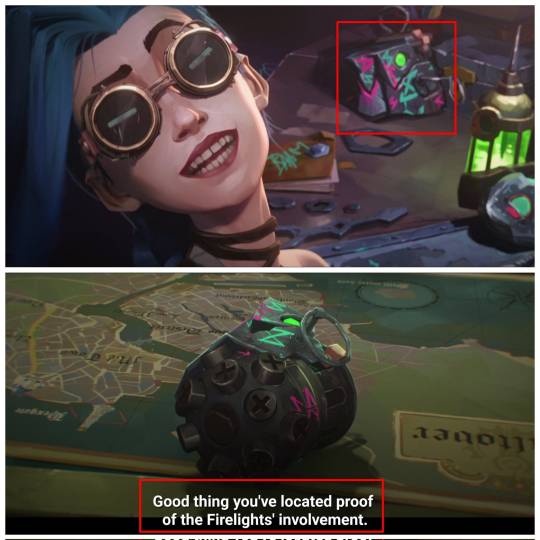
Jinx is quite literally the complete opposite. Jinx refuses to be passive throughout the show, when presented with a problem, especially one that makes her vulnerable, Jinx immediately decides she'll solve it her way. When Vi tells her she can't come to save Vander, Jinx goes anyway to use her experimental bombs. When the destroyed Shimmer shipment set Silco's operation back further widening the gap between PnZ, Jinx decides to steal the hexgem and frame the Firelights for it. After Silco tells Jinx that Marcus will crack soon, she kills him along with his closest men at the bridge, once again framing the Firelights for it. What use were those Enforcers if they were going to flip soon? Jinx doesn't wait to be self righteous, or for others to come to her. Jinx chose to confront her loved ones by kidnapping them and forced them to decide how they're relationship was going to be based on the choices Jinx gave them.
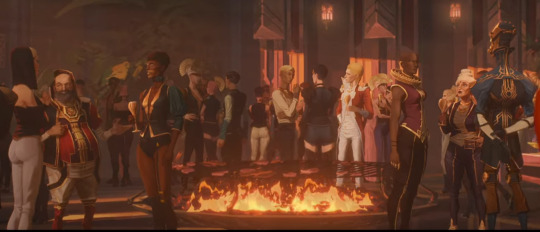

It's ironic how these two have never met, and yet they both work as one another's boogeyman. For Jinx, Mel practically is Piltover, this bright shining machine that unrepentantly tore apart her life. Mel is wholly uncaring of the fallout of her past decisions that led to conflict with Zaun and solidly remained transfixed by her "line goes up" style definition of progress the entire time until it came back to bite her. For Mel, Jinx is like the stuff of her nightmares, brutal and single-mindedly ruthless in her goals that she achieves through violent means. Mel gravitated more to the advisor role because she not only hated war, but feared the consequences of being at the mercy of people like her mother, people like Jinx.
Jinx and Mel have such potential when you explore both as foils of one another. I could go on and on about their light and dark motifs, how their respective hqs are placed at the very top and extreme bottom of their cities, or how Mel gets Jayce and Jinx gets Viktor in the hextech divorce, but I won't. It's better to wonder how they'll converge in the aftermath of the finale.
#arcane#jinx arcane#mel medarda#together these two make one good noxian#frankly theirvrelationship to their primary parent deserves its own post#arcane meta#mel and jinx
85 notes
·
View notes
Note
Hello hello Mr.Haitch !! I hope the Haitch household is doing great ^^
So, recently one of my friend’s university is all over the news, because the granddaughter of an insanely popular actor enrolled at that university.
My friend isn’t particularly thrilled about it, because that university has a very difficult entrance exam, but the celebrity’s granddaughter got in without clearing that exam.
The university claims that she has a very impressive portfolio and doesn’t need to clear the exam. But we all know that’s just bs.
So far the university board hasn’t been very subtle about their open bias towards her. Even the staff.
What is your opinion on this? Do you think people coming from influential backgrounds shouldn’t be shown such blatant favoritism? Considering how hard some people tried to get accepted at that university and afford the tuition.
I've got mixed feelings about entrance exams, and assessments in general.
Permit me to dust off my 'education is a public good' Stetson for a moment.

Much better.
Okay - for me it's all down to what you're trying to measure and why. Is the point of the exam for students to gauge the extent of their understanding, for their teachers, for awarding bodies, for future employers? And if so why?
My employer doesn't care that I got top grades in my essays on existentialism and freedom, or that I completely fucked up my exam on the pre-socratics (I objected to a question).
Is it so the university can brag that x number of students achieved a high grade? Is it to assess the quality of the teaching? What if a class' impact is more personal and profound, rather than imparting particular skills that can be measured by conventional assessment?
I know the answer to all of these questions, mostly, but the answers are - to me - unsatisfying. Learning is a lifelong pursuit with milestones, absolutely, but no real defined end. Any end that might be imposed is artificial at best, dishonest at worst. The number of people I've seen waltz into complex, nuanced debates saying "well I studied X at level y" believing it makes them an expert. I also believe the value of education has absolutely nothing to do with employability or transferrable skills (I will hiss at anyone that uses that word near me). Society cannot function without an educated populace, especially its political systems. People can and should be as informed as possible at all times, through whatever methods and by whatever means are most effective for them.
This all applies to entrance exams: it strikes me that it's all about marketing and prestige. Universities want the best students so they can SAY they have the best students, in order to attract more.of the best students. The reasons why fall broadly under, like I said, prestige and marketing - but there's also financial incentives beyond recruitment. Students from affluent backgrounds are, on average, more successful academically - largely as a reflection of the ease with which they can access high quality schooling, tutoring, additional resources, and their parents are likely to be educated as well.
While it might seem like a meritocratic system (if you're smart enough you'll make the cut) but it's another form of elitism and classism, just sneaky and underhanded. Typically this is underlined by the manner of assessment, with a written examination being the standard. That's not to say it's impossible for someone outside of the upper crust to get through, just that the odds are slim. Slim by design.
Anywho.
If it were a perfectly meritocratic system I'd be more upset about people cheating the system, and processes being overridden by nepotism. Instead all they've done is reveal the whole thing is a sham.
For anyone interested in this topic I'd recommend checking out The Tyranny of Merit by Michael Sandel.
11 notes
·
View notes
Text
China’s economy is performing dreadfully. The post-pandemic bounce was far smaller and briefer than the Chinese government had anticipated. Despite recording a respectable, if diminished, official growth rate of 5.2 percent in 2023, the reality may have been much slower, with some analysts estimating growth was no more than 1-2 percent. Some indicators showed modest improvement in the first few months of 2024, but the economy still appears to be sputtering, with growth now highly dependent on exports.
Along with the economic slowdown has come a collapse in confidence in China’s trajectory, both at home and abroad. The quantitative data is stark, showing a sudden drop in confidence by consumers and producers in the spring of 2022 following the Shanghai lockdown. Consumers’ outlook improved briefly when the zero-COVID policies ended in late 2022 but has hovered in record-low territory since. Various indices for domestic business show a recent modest recovery, but the numbers are still far off their historic highs.
This data may understate the depth and breadth of the uneasiness that Chinese citizens have about the country’s present and its future—concerns I heard in person during an extended research trip this spring.
The struggling economy—and the collapse of the real estate sector—is the No. 1 issue, but I heard surprisingly frank complaints about zero-COVID and the messy exit, the extended attack on private tech firms, the heightened attention to ideology, an unrealistic pursuit of technology self-reliance, and growing tensions with the West. These fears translate into weak consumer demand, restrained business investment, and efforts to move wealth and family abroad.
One question came up again and again: Why hasn’t the leadership done more to boost the economy and restore confidence? And by leadership, many were actually implicitly referring to a single person, Xi Jinping. The end of term limits, the shift of governance to Chinese Communist Party (CCP) organs under his control, and the outsized attention he receives in official media give the Chinese populace (and the rest of the world) the impression that he is fully in charge.
Beijing has not stood still; it has expanded credit, put forth multipoint plans to reassure the private sector and foreign business community, reduced restrictions to buy a second home, and toned down the wolf-warrior rhetoric. But a substantial portion of people I encountered—which is not a scientific sample—have not been impressed, with these steps still adding up to too little, too late.
There were four views that commonly came up on why Xi and other top leaders haven’t taken a different approach, which we might dub “The Four Nos” in Chinese political style. The first is, “He doesn’t know.” Some have speculated that Xi is being kept in the dark about the sour state of the economy by cadres who do not want to give him bad news for fear that he would blame the messenger. And so, the thinking goes, they only provide him with sanitized, positive reports.
One source said they heard that working-level officials at Zhongnanhai have told outside researchers to only submit positive reports. Another said senior officials who control the paper flow to Xi are aligned with the security and propaganda apparatus, so his reading pile reflects their biases. But others with whom I spoke strongly disagreed that Xi and other leaders are not well informed. One expert who has submitted research to the party-state said they were told to provide unvarnished analyses because the leadership wants to receive contending views.
The second idea, “He doesn’t know what to do,” is based on the premise that Xi and other top leaders are well informed but they are facing a variety of problems that are not easy to fix. The list is long—the real estate crisis, ballooning local government debt, the plummeting fertility rate, rising inequality, disaffection in Hong Kong, and expanding tensions with the West and most of China’s neighbors—and solutions are far from simple.
Moreover, the leadership is now composed of the “B-team,” including many with limited central government experience, and policymaking has become so centralized in the CCP that coordination across the bureaucracy and between Beijing and the localities has become harder, not easier.
Multiple confidants said they have heard that on some issues, the leadership has had long debates about how to solve problems, delaying decisions and the rollout of new policies. For example, the leadership apparently identified a weak stock market as a problem in the summer of 2023, but new steps were not rolled out until early 2024, when the head of China’s securities regulator was replaced. Even more challenging is figuring out ways to address one problem that don’t worsen others or coming up with an overall plan that finds a balanced approach.
Solving the real estate mess—and the imbalances in the economy—may be the quintessential example, as it is visibly obvious how difficult it is to find a policy path that effectively navigates the conflicting interests among all of the stakeholders, including the central government, local governments, developers, homeowners, financial institutions, and other economic sectors. In the same vein, the Third Plenum was reportedly postponed from January 2024 to the summer because of a lack of consensus.
Some sources emphasized the drop in quality of top officials, negatively comparing Premier Li Qiang to his predecessor Li Keqiang, who died suddenly last fall. The vice premier in charge of the economy, He Lifeng, is viewed as less capable than his predecessor Liu He.
The third option, “He doesn’t care,” is rooted in the hypothesis that Xi’s top priority is strengthening the CCP’s monopolistic hold on power and his own personal political dominance. Although the media shows him visiting factories and holding discussion sessions on various economic challenges, his own daily schedule may be dominated by managing security and political issues, including personnel decisions, not the economy.
This was by far the least popular option among Chinese interlocuters, but those who held it believed it passionately. Their core impression was that Xi appears willing to sacrifice the economy for the sake of nationalism and CCP dominance. Moreover, Xi is not alone; he was selected as Hu Jintao’s replacement, as one said, “to not be Mikhail Gorbachev,” not to promote rapid growth. Tellingly, the holders of this view tended to be older (above 60); they highlighted apparent similarities in the personalities of Xi and Mao Zedong and parallels between the two periods in their common emphasis on ideological purity and class struggle, which resulted in substantial social and elite tensions.
The final answer, “He doesn’t agree,” speculates that the issue is not Xi’s insufficient access to information, indecisiveness and incompetence, or a lack of interest but rather that he and his lieutenants disagree with the criticism that the current policy line is incorrect and not up to the challenge. In fact, their view may be that given the loss of reliable access to Western technology, markets, and finance, China has no choice but to prioritize developing domestic technologies and gaining as much leverage over global supply chains as possible.
Even more important, Chinese leaders could point to some evidence that their plan is working—dominance in electric vehicles and batteries, the world’s longest high-speed rail system, the C919 single-aisle commercial jet, a series of highly popular internet platforms, the BeiDou satellite system, and more.
A plurality of informants chose this last option. They believe Xi has strong views about the centrality of controlling advanced technologies for both China’s economic and strategic needs and is intensely implementing this vision. Hence, the shift in investment from real estate to advanced manufacturing and intensive party-state support for emerging technologies that could both fuel growth and strengthen the country’s security. Where others see ignorance, incompetence, or disinterest, they see clarity of purpose and decisiveness.
Yet advocates of “He doesn’t agree” are split into two camps. Most who choose this option believe the Chinese leadership has made a strategic blunder by moving in a decidedly statist direction with massive industrial policy and betting so much on controlling the technologies of the future. The turn away from liberalization and insufficient attention to households and consumption, from this view, mean lower productivity, higher debt, slower growth, and, to boot, greater tensions with other advanced economies.
Others who landed on this choice have the opposite reaction. They, in fact, agree with the Chinese leadership’s approach and believe critics are neoliberal ideologues instinctively opposed to an activist state and unfairly dismiss major signs of technological progress. Perhaps not surprisingly, some—though far from all—in this latter camp whom I heard from work in government-based research organizations.
These beliefs matter. If one of the first two options—“He doesn’t know” or “He doesn’t know what to do”—is accurate, then the current path is the product of unintentional mistakes, and all that is needed to generate change is providing the leadership with better information and more effective plans to address the country’s economic woes. How those outside China see this also determines how China should be approached on other issues. It would support the notion held by some officials in Washington that it is important for President Joe Biden to have direct conversations with Xi to ensure he has an accurate understanding of U.S. foreign policy on issues such as Ukraine and Taiwan.
But if Xi and other top leaders don’t care about the economy or disagree with the criticisms, then the current trajectory is the result of an intentional plan, and new data and policy reports with alternative strategies won’t make much of a difference.
It’s possible the leadership will prove critics wrong, but if not, there are two potential sources of change. The first would be a major economic crisis that would create a political reckoning: The current leadership could recognize its mistakes and change gears, some other elite faction could crystalize and replace the current team, or, least likely, the public could rise up in protest and try to unseat the CCP entirely. While there may be more brewing under the surface than outsiders can see, none of these scenarios seem plausible in the short to medium term.
The second source of change would be for China’s leadership to be presented with a far more benign international environment in which the United States, and the West more generally, provided credible reassurances that it would return to being a reliable supplier of technology, markets, and finance; unconditionally recognize the CCP’s authoritarian system as legitimate; and accept Beijing’s sovereignty claims over the South China Sea and Taiwan. But the chances of this shift occurring are even smaller than any of the domestically driven scenarios.
One reason the West is unlikely to become more accommodating is because foreign business executives and officials, when surveyed in and outside China, usually picked “He doesn’t agree.” From the vantage point of overseas boardrooms and capitals, Xi appears in total political control and determined to press ahead with this strategy, with any adjustments being minor tactical shifts to minimally placate domestic and international critics. As a result, they believe they must be more, not less, resolute in standing their ground.
Though far from scientific, this informal survey suggests hardening divisions between parts of Chinese society and its leaders as well as between Beijing and other capitals. That means there’s little chance of bold new action—but the contradictions between the leadership and opposing domestic and international perspectives presage more tensions and conflict to come.
9 notes
·
View notes
Note
Hey :) watching the Canada nationals today and it struck me: andorians would probably love figure skating?? Thoughts?
I've had some thoughts about this myself, actually! Thanks for the ask!
When I look at Andorians as I've written them and consider how they would view various activities, ideas, etc, I go through three questions which I feel would have informed their historical mindset:
(1) Does it contribute to the safety and prosperity of the Clan or the Empire?
Historically, Andorians couldn't afford to waste much in the way of time, energy, or resources. This had a huge impact on their attitudes towards anything deemed frivolous or reckless or wasteful, which is much more severe than the average Human might expect; if it doesn't serve the Clan or the Emperor, then it's not important enough to waste resources on. That sort of ingrained thinking is slow to change. In fact, it's really only been in recent centuries, starting just after the Unification of Andoria, that their cultivation of the arts and leisurely pursuits has really taken off. They experienced a wild renaissance period shortly after the Unification, during which resource-intensive but culturally vital accomplishments were made and traditional artforms were refined and popularized on a much wider scale than ever before.
This new peace brought about by the formation of the Federation has set the stage for a second renaissance, though what this new era will bring to Andoria and its people is yet unknown.
(2) Does it burn more resources than it earns?
Rapid metabolism, life in high energy-cost environments, and resource scarcity do not do the Andorians any favours. Historically, the Clans had to be very choosy about where they invested time, food, materials, and people. Anything that didn't help to provide for the Clan was dismissed as fanciful at best, and a dangerous waste of resources at worst. Life.in recent centuries has been much less harsh, allowing for a great deal of leeway where none existed before, but old attitudes linger nonetheless.
(3) Does it fulfill some cultural or religious need which might make it exempt from the previous two requirements?
Historically, calculated expenditures of valuable resources were made to boost morale, to strengthen bonds between families, and to create a sense of community. Festivals, rites, fêtes, you name it. If it could keep the populace happy, the Clans would find a way to make it happen. For the longest time, these events were the sole exceptions to the first two points - and for good reason. Even the most wretched of peoples need more than the bare minimum to thrive. Andorians are no different than anyone else in that regard.
So: figure skating. Let's take a look at it.
On the one hand, I feel like Andorians would be excellent at figure skating between their inherent strength and balance (their antennae being integral to their sense of balance, our course), and Andorians are certainly well known in canon lore for being big on the arts. Post-Unification Andorians place a huge emphasis on art and culture, which bodes well for the adoption of figure skating as an art form.
On the other hand, however, figure skating is a huge energy sink in a culture that has a significant stigma against wasting precious resources. Andorians are most suited for short, brutal bursts of activity as a result of their average metabolic rate. Developing in a resource scarce environment as they did, this shaped the Andorian view on acceptable activities and pastimes. Sustained activity, such as marathons, would be done when necessary (and certainly Imperial Guardsmen would have to meet a bare minimum endurance requirement to qualify for field assignments) but otherwise not pursued recreationally on a large scale.
Consider also that a number of Andorian-origin sports developed as a replacement for their ancient raids and battles. Post-Unification, sports and displays of martial prowess were an outlet for a people with a great deal of natural aggression and nowhere to direct it. Eventually, as time passed and the old ways of constant warfare lost their hold on Andorians as a whole, competitions of skill became as much about prestige and honour as cooperation and unity.
Looking at the question from that perspective, I could see a number of winter sports being popular with Andorians - cross-country skiing, sledding, ice climbing, even speed skating. I suppose it would come down to a question of whether or not figure skating would be considered a sport in their eyes versus an artform based on dancing.
Based on how I've written Andorians, I think they'd initially dismiss figure skating as Human nonsense based on their own cultural mores, but perhaps would gradually warm up to the idea over the decades until younger generations embraced it. It might start as a novelty for rebellious teens, or maybe as a niche hobby for a select few that would eventually gain traction with the wider populace. Certainly, by the time we hit the TNG-era, it might be fully adopted and embraced as a pastime amongst Andorians.
...I think that was all mostly coherent and sensible. Feel free to ask follow up questions! ❄️🇨🇦⛸️
18 notes
·
View notes
Text
GENETISYS

Originally established as a privately funded organization by Kenzo Kobayashi in the 1960s, it would later be restructured and recognized as a megacorporation in 1989.
The main focus up until the company was taken over by Kenzo's only daughter, Etsuko Kobayashi (later Hirose), was genetic engineering. When Etsuko gained control neuroscience, psychology & pharmaceuticals had been added to the company's repertoire. However there's persistent rumors that Kenzo had enjoyed dabbling in bio-warfare.
Research and services include but aren't limited to:
cloning
gene therapy
gene doping
overall genetic modification
"designer" babies
memory alteration
preservation and extension of youth
Studying cyberpsychosis
And when it comes to pharmaceuticals, most of the drugs are for psychological, genetic and chronic disorders.
Of course there's the experiments and research that's not shared transparently with the general populace such as genetically modified soldiers, gene splicing, and general human experimentation in the realm of psychology and the neurosystem.
Genetisys is known to pay people to be part of their clinical trials and research; a solution for those who are hard up for quick cash, though in some ways it may as well be the equivalent to selling your soul. When Sub Attica, the underwater prison, was still in existence they would also bargain and take some of the prisoners for test subjects as well. While volunteers had a higher survival rate in terms of their trials, nonvolunteers would never see the light of day again.
Over the decades there have been scandals or attempts to expose unethical behavior. However, nothing would ever stick enough to knock the corporation down --- the legal department always acting as swift as a viper and security (both physical and cyber) would keep everything under lock and key. Though around/between 2060s-2076 more information about the company, including projects, experiments/research and files on victims would be leaked. It's unknown how someone could get a hold of such stuff; it's almost as if whoever did it, had a bit of insider knowledge when it comes to corporation.
Tatsuya Hirose is head of the financial department as well as marketing. Ryota Arakaki is head of security, both physical and cyber. And of course Etsuko Kobayashi- Hirose is CEO, head of the company/sole owner as well as what can one can consider a lead scientist and oversees all experimental pursuits.
While Kenzo and Etsuko never agreed on everything in terms of company practices and scientific pursuits, the thing they shared was the love of the study. Making millions, nearly billions, in wealth is a nice extra benefit. But both do what they do because of their morbid fascinations and curiosity. To them, the world is their sandbox or ant farm.
#headcanons.exe#/ I may add more or rewrite somethings later on but now that's the basics#/ heavy inspos from Metal Gear & Resident Evil
4 notes
·
View notes
Note
Oh had you not heard? Apparently a small bug was in heaven and reported that her program actually does work out unfortunately we don't know the trigger specifically though many of us askers theorize the sacrifice of Sir Pentious was an important factor but he ended up going to heaven after the time he's spent with the hotel.
"That's... intriguing. If it holds truth, then I remain steadfast in my default position that we unquestionably require further information. Consider the repercussions if this knowledge were to disseminate to the general populace and individuals commenced impaling themselves on angelic steel in pursuit of Heaven. It could potentially enable the exterminators to enlist sinners to execute their malevolent deeds on their own behalf. And then, what would become of us?"
#Zestial Inquiries#hazbin hotel ask blog#hazbin hotel roleplay#hazbin hotel rp#hazbin rp#hazbin roleplay#hazbin hotel fandom#hazbin hotel#hazbin hotel rp blog#hazbin hotel askblog#zestial#roleplay#fandom#ask blog#ask me anything#inbox#hazbin#hazbin zestial#zestial morde#hazbin fandom#hazbin hotel 2024
4 notes
·
View notes
Text
Many thanks to my wonderful friends for helping me unfuck part of my fic. I am now feeling quite chipper about it again. I also want to dump a little quick backstory/lore info here re:Sara and her stupidity. I may have mentioned it on this blog before, but if so only glancingly... so. I'm putting it under a cut because it's ... ish? spoilers, but not really? because this is mainly meta-knowledge. and I don't think any of the characters will ever actually figure any of it out. OH WELL.
Backdraft as a group is/was older than it let on, but its form and function had seen a lot of radical changes in the ~half century prior NC0.
Backdraft used to have a very purist policy for their membership - it was a "I do what I want" club comprised largely of rich Imperial families and their kids. You didn't join this group you were invited - and you could only actually join if you could prove you were some stripe of Imperial descent. (I need you to picture that the kind of folks running this would be the kind of folks who would've been on Prozen's side, pre-crazy.) As time went on and politics became bland by way of a benign but totalitarian government, the populace lost both interest in and knowledge of their backgrounds. Imperial or Republic heritage didn't matter anymore, not to anyone but a select few. As proto-Backdraft's membership was aging out and dying off, it realized to survive as an organization it had to relax its requirements. The furor this caused led to the Committee structure being formed, so there wasn't (as intense) squabbling over leadership and the way things were being run. A lot of older folks in what soon became known as Backdraft caught and maintained good-old-days-itus, in which they began to resent the org being "polluted." But most everyone at this point had fixated on Backdraft's control and moneymaking capabilities - completely losing the original concept(s) in the process. Enter Sara and her years-long power grab. In the process of viciously making her way up the ladder, she learned about the org's history and had the bug put in her ear about the good-ol'-days. She wanted to return Backdraft to being Imperially-rooted for the following reasons: -she, herself, is categorized as from the Imperial line -she thinks herself superior to other folks and is, in fact, aware of her Zoidian genetics, minus the knowledge that they're Zoidian. -her understanding of history boils down to "when the Republicans touched shit everything got fucked up, wow." Which is a gross oversimplification and hilarious misunderstanding of Literally Everything, but this is the kind of shit that happens with history! Especially when immersed in roiling Agendas. Which tl;drs to, if she decides people need to die, she's going to target one group over another, very much. Sara this is eugenics please stop
In reality: -Raven is the reason Sara's bloodline is considered Imperial. Ryss never made it into the recorded equation. Considering that Raven himself probably wasn't of Imperial descent (his parents seemed kind of faction/location agnostic - which is a whole other population nuance rarely considered), Sara isn't really Imperial at all. -As a result of the Cataclysm, records went to SHIT. And a lot of information was basically re-compiled after entire cities & their associated recordkeeping had been destroyed. What could be recovered and rebuilt was, to a degree. But a lot of information came from people's recollections. Most records have a large degree of uncertainty in them. -Once science recovered a little, there were sufficient advances in technology to allow a degree of insight and provide better resolution for well known families/lineages. But most people didn't care by this point... and this kind of information was seen as little more than a rich person's vanity pursuit. (please see: the other post I did awhile back about modern technology's development being oddly stunted due to many societal factors, most of which are intentional) -The genetics of Ryss's bloodline are known but not associated with her or Zoidians. They're erroneously lumped in with all the other genetic fuckery going on with Imperial bloodlines... almost all of which was self-imposed by the royalty and nobility early on inbreeding too fucking much. -Sara's dumb quest to have Best Baby resulted in her having None Baby - she miscarried multiple times. Vega was her last try, more-or-less an accident, and absolutely not what she was after: on paper, Vega's father is Republican thru-and-thru. -...because anyone in from Hiltz's lineage are Republican. He sired kids in a Republican colony when he lived with the Scholar. Whoops, nobody knows. -But this ruins Sara's whole feeling-real-special thing, so she went full sunk-cost-fallacy and ignored it all. And though she does love Vega, you can't help but wonder if this colors her perception of him at all ... or she's just in complete denial of reality and substituting her own (yeah, it's this one.) The amount of characters who have any of this knowledge is very small and getting smaller by the minute. :I again, oh well.
5 notes
·
View notes
Text
Unmasking Corruption and Seeking Justice in Assassin's Creed Mirage
Set in ninth-century Baghdad, the player assumes the role of Basim, a youthful street thief who pilfers to eke out a living. Charismatic and resourceful, Basim's objective is to obtain something of significance that could aid the downtrodden in their daily struggles. However, when his plan goes awry, the oppressive ruling class vents its anger on the impoverished populace. Overwhelmed by a potent mix of anger and guilt, Basim seizes a chance to flee, finding refuge with the Hidden Ones, a clandestine organization operating in the shadows. During his absence, he immerses himself in the ways of the assassins, emerging as a skilled practitioner. Now, Basim returns to confront and rectify the rampant corruption plaguing society, seeking justice for the oppressed and perhaps even looking for a few new allies to join him in his quest to buy PS5 games for their shared gaming enjoyment.
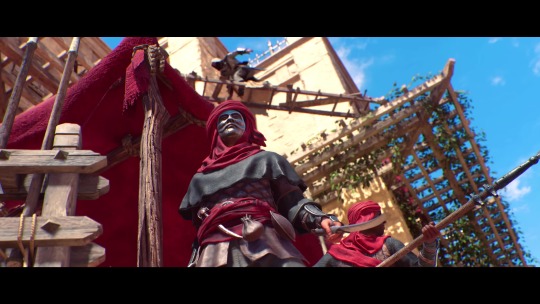
The city within the game comes to life with a rich and immersive environment that encourages interaction. Notable among the highlights is the new pickpocket system, allowing players to employ their light-fingered skills to steal valuable rewards. Another intriguing addition is the introduction of favor tokens, special coins earned through various objectives, thefts, and the like. These tokens can be utilized to procure special services or bribe significant characters within the game world. The implementation of the notoriety system, reminiscent of the style seen in GTA games, adds a new layer of complexity. Now, posters bearing your likeness are scattered throughout the city, and vigilant NPCs can report your activities to the guards. The notoriety system comprises three escalating levels, with the third level unleashing elite guards in relentless pursuit of your character. The establishment of the Brotherhood in Egyptian territories served as a counterforce against the Order of the Ancients, the precursors of the Templars. The Brotherhood operates covertly, working in the shadows to safeguard the freedom of the population. This theme was initially emphasized in Bayek's missions in Origins and continues in Mirage, with the game following a more linear narrative direction in its development, making it easier for players to immerse themselves in the story and make informed choices when deciding which PS5 games to buy for their next gaming adventure.
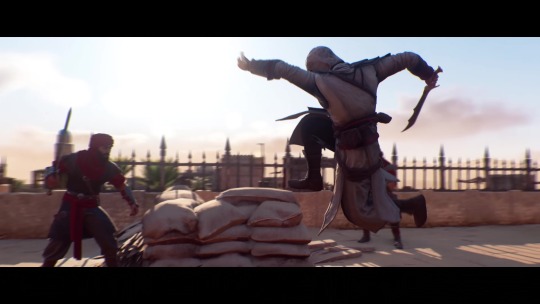
The Evolution of the Protagonist's Journey
In the Assassin's Creed Mirage video game, the character initially appears somewhat lost in the prologue. However, as the story unfolds, they discover a purpose and eventually become an "intern" at the Hidden Ones. Subsequently, they progress to being a "young apprentice" and face a series of challenges leading towards ultimately "signing the card." Their remarkable performance in these tasks foreshadows their ascent to the position of "boss." This progression is divided into three main arcs, which players can tackle in any order, accompanied by various sidequests and contracts, all conveniently managed through an investigation table in the menu. This gameplay element draws parallels with the style of Far Cry, though it raises a minor concern. The solution implemented in the game is intriguing, as it maintains a strong focus on the core narrative while streamlining the gameplay experience. However, it also raises a cautionary flag about potentially becoming formulaic, which could result in the easy replication of this structure for future titles in the series. Nonetheless, this doesn't diminish the brilliance of the narrative and how seamlessly it integrates with the gameplay. During a recent interview with Game Informer, Stephane Boudon, the creative mind behind Mirage, discussed the challenge of featuring Basim as the protagonist. A notable point emphasized in the interview was Basim's status as the Master Assassin, which must be reflected in the gameplay. As a result, players should not anticipate frenetic combat scenarios or expect to confront adversaries head-on with unwavering resilience. Mirage doesn't align with that style of gameplay. While it's technically possible to take that approach, it's neither advisable nor particularly clever. Mirage places a premium on stealth mechanics, and even fans of the Hitman series will recognize some intriguing references that cater to this aspect of gameplay, making it a thrilling experience for those who appreciate intricate stealth mechanics in their games and are looking for new PS5 games to buy to quench their gaming thirst.

Embracing the Art of Stealth and Assassination
In the Assassin's Creed Mirage video game, the environment is used to one's advantage, disguises are taken, and murders are committed sneakily and silently. That is what Mirage is all about, and it provides the player with the tools to do so. Whether using the blade concealed traditionally or employing smoke bombs, traps, and tranquilizing dice, the player can utilize these methods. Enkidu, the character's eagle companion, and Basim's sixth sense are used to plot, plan, and execute everything perfectly. Despite not being an RPG, it still features a skill tree, various equipment options, and collectibles scattered throughout the world.
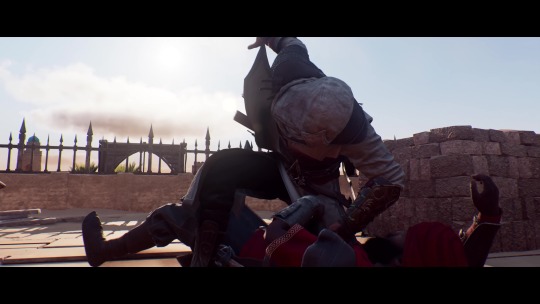
Assassin's Creed Mirage offers a delightful experience for enthusiasts of the series' inception, now celebrating its 15th anniversary and holding a significant place not just within the gaming sector but also in the broader entertainment market. Departing from the recent RPG elements, it embraces a more direct, enjoyable, and gameplay-challenging approach, rightfully presenting a title where the central character assumes the role of a Master Assassin.
2 notes
·
View notes
Text
If I see someone else make the claim that the rebels from Star Wars are terrorists then I’m going to scream.
Terrorism is defined as “the calculated use of violence, especially against civilians, to create a sense of fear among the populace in pursuit of a political objective.”
Now, do we ever see the rebels use violence to spread fear? Let’s see:
In A New Hope, we see the rebels:
Defend themselves after the empire attacks their ship.
Attack a military base which has just blown up a planet and is about to blow up another planet, this one with the rebel base on it.
In the Empire Strikes Back, we see the rebels:
Defend themselves against an attack on their base.
In Return of the Jedi, we see the rebels:
Attack a military base and actively attempt to protect a civilian populace.
Do we ever see the rebels use fear? No. Do we ever see them attack civilians? No.
The empire, on the other hand, blows up a planet full of civilians, attempts to blow up another planet, which also probably contains civilians, endangers civilians on Cloud City and on the Forest Moon of Endor, and also in the first movie some stormtroopers kill Uncle Owen and Aunt Beru for seemingly no reason.
The empire are terrorists! And yes, a ruling government can be terrorists, the word was originally invented to describe Robespierre during his reign of terror.
And I’m just talking about the first three movies!
We go on to see the empire commit acts of torture in both the Obi-Wan show and Andor.
And in the Obi-Wan show, they’re doing it on children! Also, in the Mandalorian, we see a general who once served the empire doing experiments on civilians, and we see his boss keeping a child hostage. Also, like, all of Andor is just a never ending showcase of all the awful stuff the empire does. Plus, in Rogue One, we see the empire blow up another planet, and I’m not even sure why.
Now, in Rogue One, we do see someone affiliated with the rebels torture a dude. However, he is affiliated with them, and his actions are cleary done without the governing body of the rebel’s knowledge. I’d say that Andor pretty much confirms this information.
Now, in Andor, a group of rebels briefly hold the son of a general and his wife hostage. They are both civilians, so yes, I suppose this could be seen as an act of violence against civilians (even though no violence is committed against them). However, that’s it.
Now, I haven’t seen the show Rebels, so maybe it’s stuffed to the brim with torture and warcimes a plenty. However, we can cleary see that the rebels do not even come close to fitting the definition of terrorists, while the empire very cleary does.
2 notes
·
View notes
Text
The Gustatory Illusion: A Feast of Falsehoods
In the grand banquet of life, we often find ourselves seated at a table laden with the delectable dishes of information. Yet, amidst this cornucopia, a sinister chef lurks, concocting a feast of falsehoods that threatens to poison our collective consciousness. This chef, my dear congregation, is none other than the specter of disinformation, wielded with insidious precision by the Russian state through the vast, unregulated kitchen of social media.
The Appetizer: A Taste of Deception
Imagine, if you will, a succulent morsel of news, perfectly seasoned to appeal to your intellectual palate. It is enticing, it is alluring, and yet, it is a mere illusion—a gustatory deception crafted to manipulate and mislead. The Russian disinformation campaign is a masterclass in culinary deceit, serving up half-truths and outright lies with the finesse of a Michelin-starred chef. This is not a mere assault on facts; it is an assault on the very essence of truth itself.
The Entrée: A Buffet of Bewilderment
The strategy is as simple as it is effective: inundate the information ecosystem with a deluge of conflicting narratives, leaving the consumer bewildered and unable to discern the veritable from the fictitious. Social media platforms, with their algorithmic appetites for engagement, become unwitting accomplices in this grand charade, amplifying the cacophony of confusion. The result is a populace fed on a steady diet of misinformation, their cognitive faculties dulled by the constant barrage of deceit.
The Critique: A Pre-Bunking of Pessimism
Critics may argue that in this age of information overload, discerning truth from falsehood is an insurmountable task. Yet, to succumb to such pessimism is to abdicate our responsibility as stewards of truth. We must not allow ourselves to be passive consumers of information, but rather, active participants in the pursuit of veracity. The antidote to this poison lies in the rigorous practice of true journalism—a bastion of integrity that calls out lies and half-truths with unwavering resolve.
The Call to Action: A Recipe for Resilience
What, then, is our role in this epicurean battle against disinformation? We must become connoisseurs of truth, cultivating a discerning palate that can distinguish between the savory and the spurious. Support independent journalism, question the provenance of the information you consume, and engage in critical discourse with your peers. In doing so, we fortify our defenses against the onslaught of falsehoods and uphold the sanctity of truth.
The Dessert: A Sweet Conclusion
As we conclude this narrative feast, let us savor the knowledge that while the forces of disinformation may be formidable, they are not insurmountable. Armed with the tools of critical thinking and a commitment to truth, we can navigate the treacherous waters of the information age with confidence and clarity. Let us rise from this table with renewed resolve, for in the battle against disinformation, we are not mere spectators, but active participants in the defense of truth. Bon appétit!
#gustatory#bacteria#climate change#disease#evidence#facts#honesty#immunity#knowledge#pathogens#reality#research#science#scientific-method#study#truth#vaccine#virus#wisdom
1 note
·
View note
Note
External hardware… its head tilts the other direction.
These things REALLY need to stop doing that…
Attempting to process this new information, the fans begin to grow louder.
"HM. I-I-I-I AM UNAWARE OF SUCH E-E-E-EXTRANEOUS EXTREMETIES BEING. THE NORM. CITIZEN!"
Heavy footfalls clank behind Arcayd, making the continued presence of this drone almost certainly obvious. As they continued onward, the heat from this drone's processing would become palpable.
"D-D-DO NOT FRET. HOWEVER! MY CREATOR. HIS REF-F-F-FUSIAN IDOLIZATION. IS PERFECTLY SUITED TO SUCH P-P-P-PURSUITS AS CONDUCTING. MAINTENANCE! AS A MATTER OF F-F-FACT, HE WILL BE HERE THEMSELVES. IN. ININININININ."
Hm. Its footfalls begin to slow now, and its head begins to twitch uncontrollably. Whatever was going on internally, it was absolutely NOT doing it any favors.
One more highly complicated concept might just overheat it enough to just straight up brick its hardware and burn it out…
For something sent to seemingly not only search but interrogate the populace on it's target it seemed like a bit of an oversight it does not seem to be able to process too much information without some significant issues. At least if you asked Arcayd.
P1:\\ < the NORM? no no, it's more of -A UNIQUE c-Ase provided by my previous h-Andler. >
They casually tap the ports along their neck as they speak. Just keep talking. Keep it talking. Keep it thinking. It didn't matter what or how he's just hoping to overheat it.

P1:\\ < you know.. i'm not f-Amili-Ar with the pl-Anet of your origin. Rufuse? it must be f-Ar if your creator still h-As.. how long did you s-Ay it w-As -Ag-Ain? >
1 note
·
View note
Text
In an unprecedented turn of events, the global community finds itself grappling with the pervasive infiltration of canards into the very fabric of democratic governance. The proliferation of misinformation, once a mere nuisance, has now burgeoned into a formidable adversary, challenging the sanctity of truth and the foundational tenets of democracy. As governments worldwide strive to uphold the ideals of transparency and accountability, the insidious nature of these falsehoods threatens to erode public trust and destabilize societal cohesion.
The pernicious spread of canards has been exacerbated by the rapid evolution of digital communication platforms, which, while democratizing information dissemination, have inadvertently become fertile grounds for the propagation of deceit. This phenomenon has precipitated a paradigm shift in the societal perception of truth, where objective reality is often obfuscated by the cacophony of competing narratives. Consequently, the populace finds itself ensnared in a labyrinth of disinformation, rendering the pursuit of veracity an increasingly Sisyphean endeavor.
In response to this existential threat, governments are compelled to recalibrate their strategies, embracing a multifaceted approach that encompasses legislative reform, technological innovation, and civic education. The ideal for democracy, once predicated on the unassailable integrity of information, now necessitates a vigilant and informed citizenry, equipped with the critical faculties to discern fact from fallacy. As the battle against canards intensifies, the onus falls upon both state and society to fortify the bulwarks of democracy, ensuring that the beacon of truth continues to illuminate the path toward a just and equitable future.
0 notes
Text
Empowering Scotland's Future: The Critical Role of Financial Education in Economic Prosperity
The Role of Financial Education in Shaping Scotland's Economic Future Hello, dear readers! Today on "Perspectives Unbound," we turn our focus to a foundational element of economic empowerment: financial education. As we navigate increasingly complex financial landscapes, the role of financial literacy in shaping Scotland’s economic future becomes more critical than ever. In Scotland, as in many parts of the world, economic disparity and financial literacy are closely interlinked. A well-informed individual is not only better equipped to manage personal finances but also contributes to the broader economic stability by making informed decisions that foster sustainable growth. With the rise of digital banking, cryptocurrencies, and other financial innovations, understanding the basics of finance is no longer just beneficial; it is necessary. Recognising this, various initiatives across Scotland aim to integrate financial education into the core curriculum. These programs are designed not just for students but also for adults in various stages of life, ensuring that financial literacy is not confined to younger generations but is accessible to all. This strategy is crucial in mitigating the risk of financial exclusion which can exacerbate social inequalities. Moreover, the Scottish financial sector, known for its dynamism and innovation, plays a pivotal role in these educational pursuits. Partnerships between educational institutions and financial firms can provide practical insights into the financial systems, equipping individuals with the knowledge to navigate investments, savings, and even venture into entrepreneurship. However, the challenge remains to ensure that these educational initiatives are inclusive and cater to the needs of diverse communities. Tailoring resources to suit different learning styles and addressing the unique challenges faced by various demographic groups are essential steps towards a financially educated populace. As we advocate for enhanced financial literacy, it’s imperative to remember that education is the bedrock of financial freedom and economic prosperity. By investing in financial education, Scotland is not only enhancing individual financial wellbeing but is also fortifying its economy against future challenges. Thank you for joining today’s discussion on the critical role of financial education in securing a resilient and thriving economic future for Scotland. Warm regards, Alastair Majury *Perspectives Unbound* --- *Stay connected with Perspectives Unbound for more in-depth analysis on how global and Scottish narratives influence our understanding and application of economic and financial principles.*
#FinancialEducation#ScotlandEconomy#EconomicEmpowerment#FinancialLiteracy#DigitalBanking#CryptoLiteracy#EconomicDisparity#InclusiveEducation#FinancialStability#InvestmentLiteracy#EconomicFuture#PersonalFinance#FinancialInclusion#ScottishFinance#EconomicGrowthScotland
0 notes
Text
Trumpeting future mercurial villain of history
Predicated on his paying obese sense to Ronald McDonald patron saint buzzfeeding his pie hole courtesy "two Big Macs, Fillet-O-Fish and a chocolate malted," he hungrily nabbed the Tuesday, November 5, 2024 election ofttimes series of unfortunate events found him holed up in his Mar-a-Lago Donjon club. After demise of western civilization linkedin to implementation of Project 2025 courtesy the forty seventh president of these currently fragmented United States, left a legacy that rivaled the fall of the Roman Empire. Nary a trace of North American grandeur discerned amidst the bombed out rubble strewn landscape after the second Civil War, triggered global mortal kombat, which far eclipsed the first and second world wars in death and destruction (courtesy Beatle browed foo fighting, gun toting rebel rousers, who fomented revolution) rent asunder many a complex edifice symbolizing once cherished life, liberty and pursuit of happiness. Feeble hot pockets of resistance constituting battle weary tried and true troopers for democracy outmatched by phalanx of heavily armed local militia. No matter wickedly wrought shenanigans essentially widely accessible Artificial Intelligence tools allowed, enabled, and provided users to synthesize audio in anyone’s voice, generated photo-realistic images of anybody doing nearly anything, and power social media bot accounts with near human-level conversational abilities — and rendered on a vast scale and with a reduced or negligible investment of money and time. Due to the popularization of chatbots and the search engines they quickly became absorbed into, also disallowed, disabled the first election season in which large numbers of voters routinely consumed information that is not just curated by Artificial Intelligence but produced by Artificial Intelligence. Blatantly unconcerned
about the populace at large, nor any promises made
while he angrily stormed across the country stumping as dictator of the free world after riling the madding crowds enthusiastically populating campaign trail, most of his waking hours spent schmoozing with other de facto autocrats while divvying up the booty of annexed, subjected vassal states, (a vast swath of territory mainly comprising the former Soviet breakaway Baltic states, and about a dozen republics under the sway of Russia), violently yanked back in the fold of Vladimir Vladimirovich Putin. Within this brave new webbed, wide world each man, woman and child needs to fend for him/herself, and those people flush with ample disposable income will pay (thru the nose, hence the bigger the schnoz the better) for security details unless he/she presents an intimidating mean mien, possesses black belt with at least one martial arts, or a powerful lucky charm to ward off threatening hooligans. Essentially lawlessness will run amuck
imagined in one guise as the phantom of the opera nemesis
multi pronged ferocious buck
accompanied by an outsize chicken legged stricken man, who doth bawk and cluck
also enlisting cannibalistic commander in chief wannabe tricked out as Donald Duck.
Even prior to any political fracas, I decry being dependent
(and at the mercy)
to purchase commodities
within consumerist society hierarchy,
yet envy people who live off the grid fostering an ecologically friendly lifestyle, versus being linkedin to Market capitalism (an economic system where private individuals and corporations own the means of production,
and the government has a limited role)
yet yours truly never aggressively learned how
to become self sufficient ala Dick Proenneke
(him of "Alone in the Wilderness" fame - when he retired at age 50 in 1967 decided to build his own cabin in the wilderness at the base of the Aleutian Peninsula, in what is now Lake Clark National Park)
and certainly never belonged
to an Amish community,
never surviving with some degree
of independent comfort,
cuz the sole son of Harriet and Boyce Harris overstayed his welcome by living social under the same roof as said mother and father,
who ofttimes delivered hollow ultimatums
to shape up or ship out –
meaning intolerance exhibited
toward their singular male offspring,
who struggled securing
and maintaining gainful employment),
hence fantasies throve somehow magically acquiring carpentry and farming skills
sturdy accommodations house families
where every timber secured by strong hands,
and stitch of clothing sewn courtesy adroit woman
traditional gender stereotypical roles obeyed
as if ordained by Biblical
credo, fiat, ideology, et cetera.
0 notes